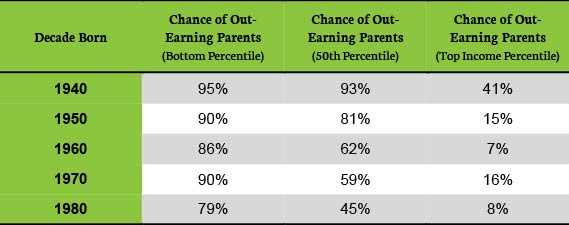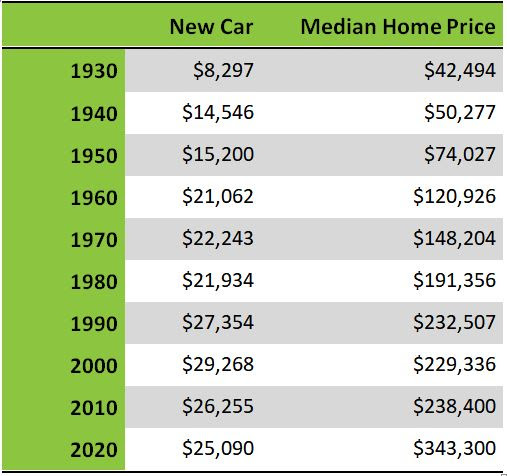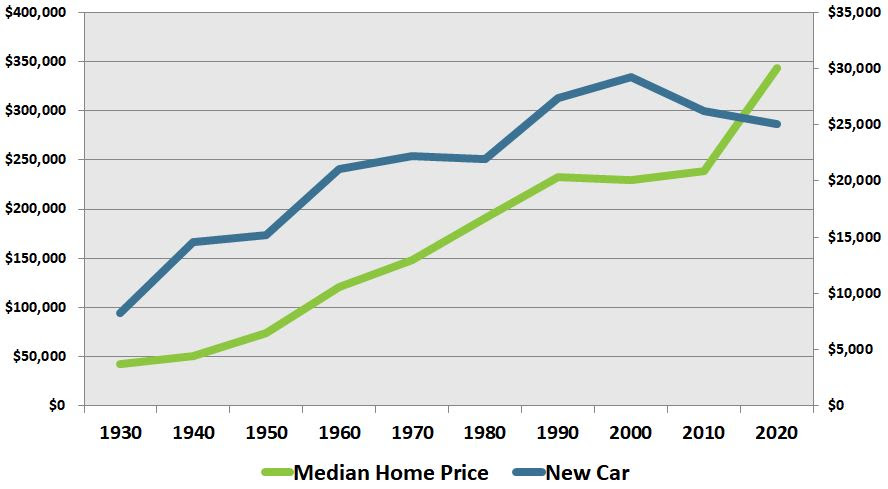Economic Mobility During Our Lifetime

With only 58 days until the election, we are off to the races. With very few exceptions, the message of every politician running for office can fall into two categories:
#1 The best days are behind us, vote for me and I will return us to them
#2 The best days are ahead of us, vote for me and I will get us to them
Nobody gets elected with the message, “Under my leadership, your life will be the exact same.” We live in a cloudy world where information can be so easy spun, twisted, and fabricated. There is a lot of shouting over whose solution is better. We will not add to this, but wish only to gain a clear view of the problem.
We thought it would be interesting to quantify a simple question: Is life becoming economically easier or harder for people in the United States?
To start this off, think about your parent’s economic situation. Think about their lifestyle when they were about 30 years old. Were they well off or struggling? Did they own a house? How often did they buy a new car? Did they hire help? Did both of your parents work?
Now, think of yourself when you were 30 years old. Was life easier for you?
Now, think of your children (or someone a generation younger than you). Is life easier for them or harder?
We can measure this in a general manner across time by analyzing, “What percent of people are earning more money than their parents?” Further, we could look at this across different income ranges. If your parents are poor, are you more likely to out-earn them than if they are rich?
Wages: Earning More than Your Parents?
If you were born in 1940 in a middle class home, you had a 93% chance of having a higher income than your parents when you were 30 years old. This is adjusting your income for inflation. If this number is greater than 50%, it means that society is enjoying upward economic mobility – meaning, on average, people are getting more prosperous.
On the other hand, if you were born in 1980 the picture was not nearly as rosy. The average person born in 1980 had only a 45% chance of out-earning their parents at age 30 (and only an 8% chance if your parents were rich). Here are all the numbers:

Source: Visual Capitalist
What this means is that economic mobility has been falling each successive decade. The odds are that people born around 1980, have a less than even chance that they will out-earn their parents. To put this trend visually, we can see this by decade (the lower the line as a whole, the lower the economic mobility):

The people born in 1990 are not quite 30 years old and so the data isn’t in yet, but it’s likely the trend will continue.
The key culprit is that in real money, wages haven’t moved for the average worker over the past 50 years. In 1973, the average hourly wage (in today’s money) peaked at around $24.00. In 2018, it was $22.65 (Source).
Prices: Paying More than Your Parents?
From a standard of living standpoint, stagnant wages may not be so problematic if prices had stayed the same. However, prices have continued to rise. If we look at the prices of new cars or an average home we can see how much the prices have gone up, even adjusted to today’s money.
In 1930, the median home price was $42,494 in today’s money. In 1970 (when folks born in 1940 turned 30), the median home price was $148,204 in today’s money. Today, the median price is $343,000. We can see this upward price trend


When we combine these two realities, GreenStar Advisors have an answer our initial question: yes things have become progressively harder with each generation. Or to put it more pointedly, your kids have it harder than you did.
We could also throw in other challenges such as how expensive education has become or the cost of health insurance which has risen 160% in just the past 20 years in real dollars. It should surprise no one that most households are dual income (sometimes with multiple jobs per person) and that homeownership rates are lower.
With this, we are painting in very broad strokes. It goes without saying that when you factor in other things such as discrimination that effect economic mobility, it adds more paint to the picture. Our aim is to hopefully identify that there is a problem here.
:

